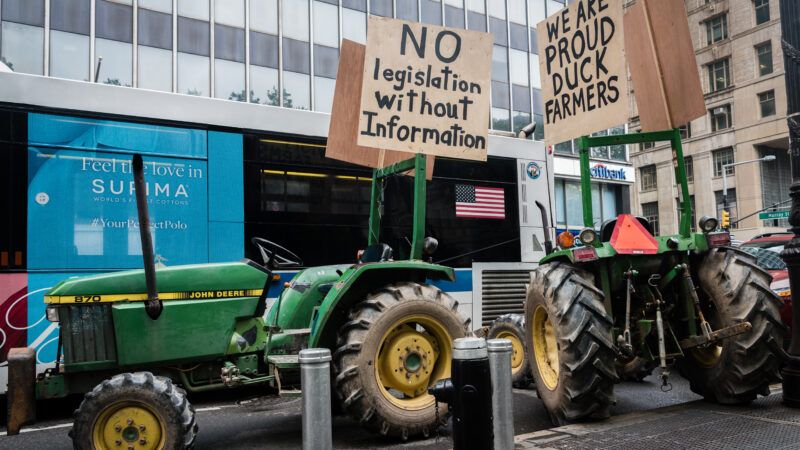New York City’s Foie Gras Ban Once Again Deemed Illegal by New York State

New York City’s terrible foie gras ban, passed in 2019 at the urging of animal-rights groups, is on life support .
In an order issued last week, the state’s agriculture department found the city’s ban on the sale of foie gras violates state law. The order blasts “the City’s effort to use its police powers and business regulatory authority to bar the sale of a lawfully produced farm productnot for reasons of the health, safety, or welfare of its citizensbut to change animal husbandry practices occurring on farms outside its jurisdiction to which it objects.”
The order, which characterizes the ban as “unusual,” “unreasonabl[e],” and “legislative overreach,” gives New York City 30 days to appeal. If the city fails to do so within a monththe city says it’s pondering its next movethen the order will become final.
While I welcome the likely death of the city’s foie gras banand hated the very idea of it news of its seemingly imminent demise comes as no great surprise. That’s because the city was put on notice years ago that its foie gras ban is illegal.
“[T]he state’s Department of Agriculture and Markets informed New York City two years ago that its foie gras ban ‘directly and unreasonably restricts Plaintiffs’ farming operations in violation of’ state law,” I explained in a column earlier this year that detailed the filing of a lawsuit challenging the city ban.
This month’s order, issued by that same state agriculture department and saying virtually the exact same thing, should make that fact abundantly clear to any elected official in New York City who hasn’t been paying attention. The ban is illegal.
As the agriculture department details, New York State law “protects farmers against local laws which unreasonably restrict farm operations located within an agricultural district.” The key issue in such cases, the department explains, is whether a local law in question protects the health and safety of its residents. If it doesn’t, then the local law is illegal.
In its order , the New York Department of Agriculture and Markets notes that in 2020 it “invited [New York] City to submit documentation or other evidence to support any claimed public health or safety threats related to… production of ‘force-fed’ livestock products.”
Instead, New York City essentially sat on its hands for two years before thumbing its nose at the state.
“The City made no factual submissions to the Department,” the order notes. Instead, the order says, the city claimed that the state agriculture department “lacks jurisdiction” to “supersede” New York City’s local ban.
The agriculture department’s order is the latest (and most serious) rebuke. In the aforementioned lawsuit, filed in May by two New York State foie gras farms, the plaintiffs argue the ban violates state law and could cost hundreds of Upstate farming jobsnot to mention restaurant jobs in the city itselfif it were to take effect. But it didn’t take effect. In September, a New York state judge enjoined the city from enforcing the ban while the case makes its way through the courts. That means city restaurants have continued to sell foie gras legally despite the ban.
This month’s order, then, likely signals the demise of a ban that never even took effect.
Sergio Saravia of La Belle Farm, one of the plaintiffs, told The New York Times the order is “a weight off our shoulders.”
“[T]he order stops local municipalities from establishing a dangerous precedent of dictating to us what farmers can grow and what people can eat,” said Marcus Henley of Hudson Valley Foie Gras, another of the plaintiffs. “It’s great news for farmers and fine diners everywhere.”
While New York City Mayor Eric Adams hasn’t yet said whether the city will fight the order, he’s previously lauded the ban.
“The days of foie gras are gone and foie-gotten in New York City,” the punny Adams tweeted in 2019 after the New York City Council passed the ban. “A new law will END this cruel practice in our city for good.”
In addition to the demise of New York City’s ban, the U.S. Supreme Court may finally hear a challenge to California’s terrible ban on the sale of foie gras in that entire state. Earlier this week, Reason Foundation submitted an amicus brief in support of the plaintiff foie gras producers who are challenging the California law. That means 2023 could spell the end of two of America’s worst food bans.